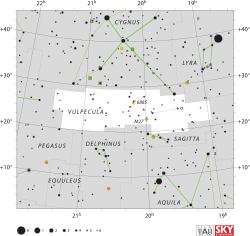27 Vulpeculae
| 27 Vulpeculae | |
 | |
| Observationsdata Epok: J2000.0 | |
|---|---|
| Stjärnbild | Räven |
| Rektascension | 20t 37m 04,67254s[1] |
| Deklination | +26° 27′ 43,0087″[1] |
| Skenbar magnitud () | +5,590 (V)[2], +5,583 ± 0,009[3] |
| Stjärntyp | |
| Spektraltyp | B9 V[4][5] |
| B–V | -0,050 ± 0,004[6] |
| Astrometri | |
| Radialhastighet () | -21,80 ± 4,3[7] km/s |
| Egenrörelse (µ) | RA: 15,25[1] mas/år Dek.: -11,51[1] mas/år |
| Parallax () | 10,27 ± 0,29[1] |
| Avstånd | 318 ± 9 lå (97 ± 3 pc) |
| Absolut magnitud () | 0,65[8] |
| Detaljer | |
| Massa | 2,77 ± 0,03[5] M☉ |
| Radie | 3,1[9] R☉ |
| Luminositet | 75,0+4,8-4,5[5] L☉ |
| Temperatur | 10 789+50-49[5] K |
| Metallicitet | -0,27 ± 0,04 (Fe/H)[8] dex |
| Vinkelhastighet | 335[5] km/s |
| Andra beteckningar | |
| 2MASS J20370467+2627429[10], GSC 02165-00436[10], HD 196504[10], SAO 88903[10], HIP 101716[10], HR 7880[10], AG+26 2337[10], BD+25 4302[10], FK5 3649[10], GC 28702[10], GCRV 12900[10], HIC 101716[10], PPM 111513[10], ROT 3003[10], TD1 27030[10], TYC 2165-436-1[10], UBV 17885[10], uvby98 100196504[10], YZ 26 11533[10], WEB 18373[10], Gaia DR2 1855937763254222592[10] och 27 Vul[3][11] | |
27 Vulpeculae, som är stjärnans Flamsteed-beteckning, är en ensam stjärna[12] belägen i den mellersta delen av stjärnbilden Räven. Den har en skenbar magnitud på ca 5,59[2] och är svagt synlig för blotta ögat där ljusföroreningar ej förekommer. Baserat på parallaxmätning inom Hipparcosuppdraget på ca 10,3[1] mas, beräknas den befinna sig på ett avstånd på ca 318 ljusår (ca 97 parsek) från solen. Den rör sig närmare solen med en heliocentrisk radialhastighet av ca -22 km/s[7] och förväntas passera perihelium på 119 ljusårs avstånd från solen om ca 3,75 miljoner år. [8]
Egenskaper
27 Vulpeculae är en blå till vit jättestjärna i huvudserien av spektralklass B9 V,[4] som har en mycket snabb rotation med en projicerad rotationshastighet på 335 km/s.[5] Den har en massa som är ca 2,8[5] solmassor, en radie som är ca 3[9] solradier och utsänder ca 75[5] gånger mera energi än solen från dess fotosfär vid en effektiv temperatur på ca 10 800 K.[5]
Referenser
- Den här artikeln är helt eller delvis baserad på material från engelskspråkiga Wikipedia, 27 Vulpeculae, 21 september 2020.
Noter
- ^ [a b c d e f] van Leeuwen, F. (2007), "Validation of the new Hipparcos reduction", Astronomy and Astrophysics, 474 (2): 653–664, arXiv:0708.1752, Bibcode:2007A&A...474..653V, doi:10.1051/0004-6361:20078357.
- ^ [a b] Paunzen, E. (2015), "A new catalogue of Strömgren-Crawford uvbyβ photometry", Astronomy & Astrophysics, 580: A23, arXiv:1506.04568, Bibcode:2015A&A...580A..23P, doi:10.1051/0004-6361/201526413.
- ^ [a b] ”Basic data: V* 27 Vul – Star” (på engelska). Centre de Données astronomiques de Strasbourg. http://simbad.u-strasbg.fr/simbad/sim-basic?Ident=27+Vul&submit=SIMBAD+search. Läst 7 juli 2019.
- ^ [a b] Cowley, A.; et al. (April 1969), "A study of the bright A stars. I. A catalogue of spectral classifications", Astronomical Journal, 74: 375–406, Bibcode:1969AJ.....74..375C, doi:10.1086/110819
- ^ [a b c d e f g h i] Zorec, J.; Royer, F. (January 2012), "Rotational velocities of A-type stars. IV. Evolution of rotational velocities", Astronomy & Astrophysics, 537: A120, arXiv:1201.2052, Bibcode:2012A&A...537A.120Z, doi:10.1051/0004-6361/201117691.
- ^ van Leeuwen (2007). ”Hipparcos, the New Reduction” (på engelska). http://vizier.u-strasbg.fr/viz-bin/VizieR-5?-out.add=.&-source=I/311/hip2&HIP=101716. Läst 7 juli 2019.
- ^ [a b] Gontcharov, G. A. (2006), "Pulkovo Compilation of Radial Velocities for 35 495 Hipparcos stars in a common system", Astronomy Letters, 32 (11): 759–771, arXiv:1606.08053, Bibcode:2006AstL...32..759G, doi:10.1134/S1063773706110065.
- ^ [a b c] Anderson, E.; Francis, Ch. (2012), "XHIP: An extended hipparcos compilation", Astronomy Letters, 38 (5): 331, arXiv:1108.4971, Bibcode:2012AstL...38..331A, doi:10.1134/S1063773712050015.
- ^ [a b] Pasinetti Fracassini, L. E.; et al. (2001), "Catalogue of Apparent Diameters and Absolute Radii of Stars (CADARS)", Astronomy & Astrophysics (Third ed.), 367: 521–24, arXiv:astro-ph/0012289, Bibcode:2001A&A...367..521P, doi:10.1051/0004-6361:20000451.
- ^ [a b c d e f g h i j k l m n o p q r s t u] SIMBAD Astronomical Database.[källa från Wikidata]
- ^ "27 Vul". SIMBAD. Centre de données astronomiques de Strasbourg. Hämtad 2018-04-21.
- ^ Eggleton, P. P.; Tokovinin, A. A. (September 2008), "A catalogue of multiplicity among bright stellar systems", Monthly Notices of the Royal Astronomical Society, 389 (2): 869–879, arXiv:0806.2878, Bibcode:2008MNRAS.389..869E, doi:10.1111/j.1365-2966.2008.13596.x.
Externa länkar
| |||||||||||||||||||
Media som används på denna webbplats
Författare/Upphovsman: IAU and Sky & Telescope magazine (Roger Sinnott & Rick Fienberg), Licens: CC BY 3.0
IAU Vulpecula chart


